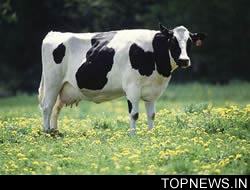Scientists unravel cow genome
 Washington, Apr 24 : An international team of scientists has successfully sequenced cow's genome, thus paving the way for more sustainable food production.
Washington, Apr 24 : An international team of scientists has successfully sequenced cow's genome, thus paving the way for more sustainable food production.
A research team involving 300 researchers from 25 countries spent six years mapping and analysing the genetic make-up of a Hereford cow, named L1 Dominette.
The findings of this study provide the means to select animals with a smaller environmental footprint, particularly animals with less greenhouse gas emissions.
"The bovine genome is more similar to that of humans than mice or rats at all levels, from genomic DNA rearrangements, to shared genes and identity of their protein sequences" said Evgeny Zdobnov, one of the lead analysts from the project and a researcher at the University of Geneva and the Swiss Institute of Bioinformatics.
He added, "The finding that about 75percent of human genes are well conserved across mammals is striking. The bovine genome gives us further insight into human biology, allowing us to highlight the loss or gain of certain gene families in hominoids.
The majority of the genes in the former group can encode several different proteins through a mechanism called alternative splicing.
"The sequencing of the cow genome allowed us to determine that this diversification mechanism is more evolutionary conserved than previously thought", said Alexandre Reymond, the leader of the analysis.
In cattle biology, chromosomal rearrangements have an influence on the genes involved in the processes of immunity, lactation, digestion and metabolism.
These changes could help explain the amazing ability of cattle to efficiently convert low-quality forage into energy-dense meat and milk, processes long exploited by man.
The study appears in journal Science. (ANI)